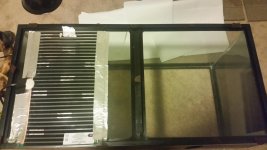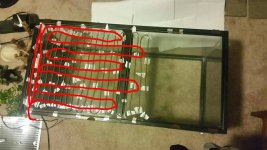procyonloser
New member
I'm a to-be new owner trying to get all the questions and issues out of the way long before actually getting my first leopard gecko.
So for all those veterans, please let me know if you have anything else in ways of advice or ideas, or if I've gone over the top.
(I have very little interest in breeding or morphs, like don't get me wrong the generics are fascinating but I just want a pet, so anything applying to breeding isn't a concern)
So, prepare yourself, for this is my list I've been making
Leopard Gecko Things To Get Before Leopard Gecko
Enclosure:
* at least 10-20 gallon wide for adults.
*front open, less scary, less cats to sit on top and be douches
*small water dish
*calcium dish!
*Reptile safe cleaner
Substrate:
*natural Stone tile, non porous (slate, quartz, ceramic is also possible)
(Buffer between glass and stone likely needed, must test heat transfer up to warm hide)
*Cocofiber, limited amount, primarily in/near cool and moist hide
Hides:
*stone hide, more natural, easy to diy
*resin or plastic based hide, preferably for cold and moist hide to avoid bacterial build up
*possible succulents or artificial plants for added pizzazz and shade
*coconut husk hide, easy to make
(Fleece hides? Adorable but are they safe? Information needed.)
Electricalish:
*Under tank heat mat, cover 1/3-1/2 the bottom of tank, preferably against glass. test to make sure heat gets up to W.hide.
*thermometer with sensor for warm hide
*humidity sensor
*(outlet timer, UTH on during day, not at night? Is a heat drop needed?)
*(lamp with UVB, limited exposure, debatable need, but likely helpful? Advice needed)
*scale
*infrared gun for temp
Supplements:
*Calcium carbonate dust (without d3?)
*reptile vitamins (not decided on brand yet, advice welcome)
*feeder insects supplements as needed
Feeder Insects, (variety is healthy):
*small-medium crickets
*dubia nymphs
*Phoenix worms?
*Superworms? Possible health risks at large size due to mandibles, more information needed, possibly just feed small/micro versions.
*mealworms (not a ton)
*wax worm (only as treats)
*horn worm (treats, grows fast, probably not for babies)
*Butter worms, ironically named, high in calcium, less easy to find.
*oats and fresh fruit for applicable insects
(Amount of food needed will likely vary depending on the gecko itself, so play it by ear?)
That's the end of the list so, please, if you have any added information or ideas please let me know!
This reads kind of like I'm a robot, I know, but this is how I make notes.
So for all those veterans, please let me know if you have anything else in ways of advice or ideas, or if I've gone over the top.
(I have very little interest in breeding or morphs, like don't get me wrong the generics are fascinating but I just want a pet, so anything applying to breeding isn't a concern)
So, prepare yourself, for this is my list I've been making
Leopard Gecko Things To Get Before Leopard Gecko
Enclosure:
* at least 10-20 gallon wide for adults.
*front open, less scary, less cats to sit on top and be douches
*small water dish
*calcium dish!
*Reptile safe cleaner
Substrate:
*natural Stone tile, non porous (slate, quartz, ceramic is also possible)
(Buffer between glass and stone likely needed, must test heat transfer up to warm hide)
*Cocofiber, limited amount, primarily in/near cool and moist hide
Hides:
*stone hide, more natural, easy to diy
*resin or plastic based hide, preferably for cold and moist hide to avoid bacterial build up
*possible succulents or artificial plants for added pizzazz and shade
*coconut husk hide, easy to make
(Fleece hides? Adorable but are they safe? Information needed.)
Electricalish:
*Under tank heat mat, cover 1/3-1/2 the bottom of tank, preferably against glass. test to make sure heat gets up to W.hide.
*thermometer with sensor for warm hide
*humidity sensor
*(outlet timer, UTH on during day, not at night? Is a heat drop needed?)
*(lamp with UVB, limited exposure, debatable need, but likely helpful? Advice needed)
*scale
*infrared gun for temp
Supplements:
*Calcium carbonate dust (without d3?)
*reptile vitamins (not decided on brand yet, advice welcome)
*feeder insects supplements as needed
Feeder Insects, (variety is healthy):
*small-medium crickets
*dubia nymphs
*Phoenix worms?
*Superworms? Possible health risks at large size due to mandibles, more information needed, possibly just feed small/micro versions.
*mealworms (not a ton)
*wax worm (only as treats)
*horn worm (treats, grows fast, probably not for babies)
*Butter worms, ironically named, high in calcium, less easy to find.
*oats and fresh fruit for applicable insects
(Amount of food needed will likely vary depending on the gecko itself, so play it by ear?)
That's the end of the list so, please, if you have any added information or ideas please let me know!
This reads kind of like I'm a robot, I know, but this is how I make notes.





